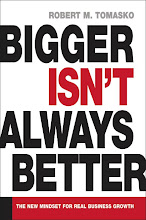January 29, 2007
Limit choice; maximize profit
Are we better off when we have more choices?
Yes, but only to a point. After a while “choice paralysis” sets in. As the number of retirement investment options increase, the chances that employees will choose any decreases. Too many types of soft drinks in a convenience store reduce total drink sales. Too many possibilities (of anything) also increase the likelihood that buyer’s remorse will set in. Once you’ve repainted your room, don’t look back at the color chart.
This is probably why waiters take away the menus right after you place your order.
Customers seldom buy a product for what it can’t do. But that’s often what keeps them happy with it.
A trio of business school professors have even quantified the problem of “feature fatigue.” They (Roland Rust, Debora Thompson and Rebecca Hamilton) outline their analysis in the Feb 2006 issue of Harvard Business Review. Their bottom line is that even though consumers “know” feature-loaded products are harder to use, BEFORE a product is purchased capability is valued over usability.
AFTER purchase is when buyer’s values change. Usability then matters much more then than capabilities.
Remember that big Swiss Army knife you bought? The one that can do everything. The one you keep in your dresser drawer because it’s too heavy to tote around.
The profs found that loading a product with features can maximize its initial sales numbers. But repeat sales to the same customer are maximized by editing down the number of features. And somewhere between these points is a happy medium – the right number of features that will maximize a customer’s lifetime value to the business.
Yes, but only to a point. After a while “choice paralysis” sets in. As the number of retirement investment options increase, the chances that employees will choose any decreases. Too many types of soft drinks in a convenience store reduce total drink sales. Too many possibilities (of anything) also increase the likelihood that buyer’s remorse will set in. Once you’ve repainted your room, don’t look back at the color chart.
This is probably why waiters take away the menus right after you place your order.
Customers seldom buy a product for what it can’t do. But that’s often what keeps them happy with it.
A trio of business school professors have even quantified the problem of “feature fatigue.” They (Roland Rust, Debora Thompson and Rebecca Hamilton) outline their analysis in the Feb 2006 issue of Harvard Business Review. Their bottom line is that even though consumers “know” feature-loaded products are harder to use, BEFORE a product is purchased capability is valued over usability.
AFTER purchase is when buyer’s values change. Usability then matters much more then than capabilities.
Remember that big Swiss Army knife you bought? The one that can do everything. The one you keep in your dresser drawer because it’s too heavy to tote around.
The profs found that loading a product with features can maximize its initial sales numbers. But repeat sales to the same customer are maximized by editing down the number of features. And somewhere between these points is a happy medium – the right number of features that will maximize a customer’s lifetime value to the business.
January 05, 2007
The folly of being the world's biggest
Yesterday General Motor’s CEO, Rick Wagoner, announced GM has no intention of ceding the title of “biggest car maker in the world” to Toyota.
Real dumb move.
Fighting Toyota is a good idea. But “who is the biggest” is the wrong battlefield.
You get to be Number 1 in the auto business by selling more cars than anyone else. This does not necessarily mean these are profitable sales (usually a good indicator that you are making the things people value). GM, like other Detroit automakers, has been hooked on discounts and incentives to move vehicles off dealer’s lots. Toyota, Honda, et al rely on eager customers to do the job.
Wagoneer says he likes being Number 1. But he’s dangerously deluding himself. GM lost that position with the car-buying public long ago. It’s just taking the numbers a while to catch up with realities – realities GM risks missing as it clings to bigness as a source of pride.
In Bigger Isn't Always Better I told the story of how Kellogg’s economic performance was badly damaged by executives and systems that focused on tons of cereal produced, not on customer tastes. At Kellogg it took a new smart-growth-oriented CEO, Carlos Gutierrez, to dig the company out of this mess and focus it on what really matters. Wonder if he’d be available to take over a once-great American car maker?
Link
Real dumb move.
Fighting Toyota is a good idea. But “who is the biggest” is the wrong battlefield.
You get to be Number 1 in the auto business by selling more cars than anyone else. This does not necessarily mean these are profitable sales (usually a good indicator that you are making the things people value). GM, like other Detroit automakers, has been hooked on discounts and incentives to move vehicles off dealer’s lots. Toyota, Honda, et al rely on eager customers to do the job.
Wagoneer says he likes being Number 1. But he’s dangerously deluding himself. GM lost that position with the car-buying public long ago. It’s just taking the numbers a while to catch up with realities – realities GM risks missing as it clings to bigness as a source of pride.
In Bigger Isn't Always Better I told the story of how Kellogg’s economic performance was badly damaged by executives and systems that focused on tons of cereal produced, not on customer tastes. At Kellogg it took a new smart-growth-oriented CEO, Carlos Gutierrez, to dig the company out of this mess and focus it on what really matters. Wonder if he’d be available to take over a once-great American car maker?
Link
